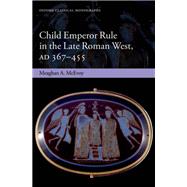Child Emperor Rule in the Late Roman West, AD 367- 455
, by McEvoy, Meaghan A.- ISBN: 9780199664818 | 0199664811
- Cover: Hardcover
- Copyright: 6/14/2013
In this book, McEvoy addresses the remarkable phenomenon of the Roman child-emperor. During the late fourth century the emperor Valentinian I, recovering from a life-threatening illness, took the novel step of declaring his eight year old son Gratian as his co-Augustus. Valentinian I's actions set a vital precedent: over the following decades, the Roman West was to witness the accessions of four year old Valentinian II, ten year old Honorius, and six year old Valentinian III -- all as full emperors of the Roman world despite their tender ages. Even though they were sons of emperors, the survival of their rule at the time of accession entailed vital support from both the aristocracy and the military of the state. Tracing both the course of their frequently tumultuous, but nevertheless lengthy reigns, the book looks at the way in which the sophistication of the Roman system of government made their accessions possible, and the adaptation of existing imperial ideology to portray boys as young as six as viable rulers. It also highlights how such reigns allowed for individual generals to dominate the Roman state as imperial guardians, and the struggles which ensued upon a child-emperor reaching adulthood and seeking to take up functions which had long been delegated during his childhood. Through the phenomenon of child-emperor rule, McEvoy demonstrates the major changes taking place in the nature of the imperial office in late antiquity, which had significant long-term impacts upon the way the Roman state came to be ruled and, in turn, the nature of rulership in the early medieval and Byzantine worlds to follow.






